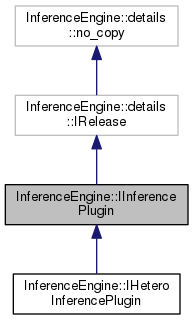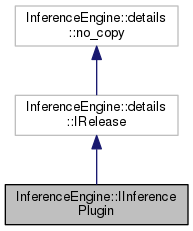This class is a main plugin interface. More...
#include <ie_plugin.hpp>


Public Member Functions | |
| virtual void | GetVersion (const Version *&versionInfo) noexcept=0 |
| Returns plugin version information. More... |
|
| virtual void | SetLogCallback (IErrorListener &listener) noexcept=0 |
| Sets logging callback Logging is used to track what is going on inside. More... |
|
| virtual StatusCode | LoadNetwork (ICNNNetwork &network, ResponseDesc *resp) noexcept=0 |
| Loads a pre-built network with weights to the engine. In case of success the plugin will be ready to infer. More... |
|
| virtual StatusCode | LoadNetwork (IExecutableNetwork::Ptr &ret, ICNNNetwork &network, const std::map< std::string, std::string > &config, ResponseDesc *resp) noexcept=0 |
| Creates an executable network from a network object. User can create as many networks as they need and use them simultaneously (up to the limitation of the hardware resources) More... |
|
| virtual StatusCode | ImportNetwork (IExecutableNetwork::Ptr &ret, const std::string &modelFileName, const std::map< std::string, std::string > &config, ResponseDesc *resp) noexcept=0 |
| Creates an executable network from a previously exported network. More... |
|
| virtual StatusCode | Infer (const Blob &input, Blob &result, ResponseDesc *resp) noexcept=0 |
| Infers an image(s). Input and output dimensions depend on the topology. As an example for classification topologies use a 4D Blob as input (batch, channels, width, height) and get a 1D blob as output (scoring probability vector). To Infer a batch, use a 4D Blob as input and get a 2D blob as output in both cases the method will allocate the resulted blob. More... |
|
| virtual StatusCode | Infer (const BlobMap &input, BlobMap &result, ResponseDesc *resp) noexcept=0 |
| Infers tensors. Input and output dimensions depend on the topology. As an example for classification topologies use a 4D Blob as input (batch, channels, width, height) and get a 1D blob as output (scoring probability vector). To Infer a batch, use a 4D Blob as input and get a 2D blob as output in both cases the method will allocate the resulted blob. More... |
|
| virtual StatusCode | GetPerformanceCounts (std::map< std::string, InferenceEngineProfileInfo > &perfMap, ResponseDesc *resp) const noexcept=0 |
| Queries performance measures per layer to get feedback of what is the most time consuming layer Note: not all plugins provide meaningful data. More... |
|
| virtual StatusCode | AddExtension (InferenceEngine::IExtensionPtr extension, InferenceEngine::ResponseDesc *resp) noexcept=0 |
| Registers extension within the plugin. More... |
|
| virtual StatusCode | SetConfig (const std::map< std::string, std::string > &config, ResponseDesc *resp) noexcept=0 |
| Sets configuration for plugin, acceptable keys can be found in ie_plugin_config.hpp. More... |
|
| virtual void | QueryNetwork (const ICNNNetwork &, QueryNetworkResult &res) const noexcept |
| Query plugin if it supports specified network. More... |
|
| virtual void | QueryNetwork (const ICNNNetwork &, const std::map< std::string, std::string > &, QueryNetworkResult &res) const noexcept |
| Query plugin if it supports specified network with specified configuration. More... |
|
Detailed Description
This class is a main plugin interface.
Member Function Documentation
§ AddExtension()
|
pure virtualnoexcept |
Registers extension within the plugin.
- Parameters
-
extension Pointer to already loaded extension resp Pointer to the response message that holds a description of an error if any occurred
- Returns
- Status code of the operation. OK if succeeded
§ GetPerformanceCounts()
|
pure virtualnoexcept |
Queries performance measures per layer to get feedback of what is the most time consuming layer Note: not all plugins provide meaningful data.
- Deprecated:
- Uses IInferRequest to get performance measures
- Parameters
-
perfMap Map of layer names to profiling information for that layer resp Pointer to the response message that holds a description of an error if any occurred
- Returns
- Status code of the operation. OK if succeeded
§ GetVersion()
|
pure virtualnoexcept |
Returns plugin version information.
- Parameters
-
versionInfo Pointer to version info. Is set by plugin
§ ImportNetwork()
|
pure virtualnoexcept |
Creates an executable network from a previously exported network.
- Parameters
-
ret Reference to a shared ptr of the returned network interface modelFileName Path to the location of the exported file config Map of pairs: (config parameter name, config parameter value) relevant only for this load operation* resp Pointer to the response message that holds a description of an error if any occurred
- Returns
- Status code of the operation. OK if succeeded
§ Infer() [1/2]
|
pure virtualnoexcept |
Infers an image(s). Input and output dimensions depend on the topology. As an example for classification topologies use a 4D Blob as input (batch, channels, width, height) and get a 1D blob as output (scoring probability vector). To Infer a batch, use a 4D Blob as input and get a 2D blob as output in both cases the method will allocate the resulted blob.
- Deprecated:
- Uses Infer() working with multiple inputs and outputs
- Parameters
-
input Any TBlob<> object that contains the data to infer. The type of TBlob must match the network input precision and size. result Related TBlob<> object that contains the result of the inference action, typically this is a float blob. The blob does not need to be allocated or initialized, the engine allocates the relevant data. resp Pointer to the response message that holds a description of an error if any occurred
- Returns
- Status code of the operation. OK if succeeded
§ Infer() [2/2]
|
pure virtualnoexcept |
Infers tensors. Input and output dimensions depend on the topology. As an example for classification topologies use a 4D Blob as input (batch, channels, width, height) and get a 1D blob as output (scoring probability vector). To Infer a batch, use a 4D Blob as input and get a 2D blob as output in both cases the method will allocate the resulted blob.
- Deprecated:
- Loads IExecutableNetwork to create IInferRequest.
- Parameters
-
input Map of input blobs accessed by input names result Map of output blobs accessed by output names resp Pointer to the response message that holds a description of an error if any occurred
- Returns
- Status code of the operation. OK if succeeded
§ LoadNetwork() [1/2]
|
pure virtualnoexcept |
Loads a pre-built network with weights to the engine. In case of success the plugin will be ready to infer.
- Deprecated:
- use LoadNetwork with four parameters (executable network, cnn network, config, response)
- Parameters
-
network Network object acquired from CNNNetReader resp Pointer to the response message that holds a description of an error if any occurred
- Returns
- Status code of the operation. OK if succeeded
§ LoadNetwork() [2/2]
|
pure virtualnoexcept |
Creates an executable network from a network object. User can create as many networks as they need and use them simultaneously (up to the limitation of the hardware resources)
- Parameters
-
ret Reference to a shared ptr of the returned network interface network Network object acquired from CNNNetReader config Map of pairs: (config parameter name, config parameter value) relevant only for this load operation resp Pointer to the response message that holds a description of an error if any occurred
- Returns
- Status code of the operation. OK if succeeded
§ QueryNetwork() [1/2]
|
inlinevirtualnoexcept |
Query plugin if it supports specified network.
Use the version with config parameter
- Parameters
-
network Network object to query resp Pointer to the response message that holds a description of an error if any occurred
§ QueryNetwork() [2/2]
|
inlinevirtualnoexcept |
Query plugin if it supports specified network with specified configuration.
- Parameters
-
network Network object to query config Map of pairs: (config parameter name, config parameter value) resp Pointer to the response message that holds a description of an error if any occurred
§ SetConfig()
|
pure virtualnoexcept |
Sets configuration for plugin, acceptable keys can be found in ie_plugin_config.hpp.
- Parameters
-
config Map of pairs: (config parameter name, config parameter value) resp Pointer to the response message that holds a description of an error if any occurred
§ SetLogCallback()
|
pure virtualnoexcept |
Sets logging callback Logging is used to track what is going on inside.
- Parameters
-
listener Logging sink
The documentation for this class was generated from the following file:
- tmp_docs/inference-engine/include/ie_plugin.hpp